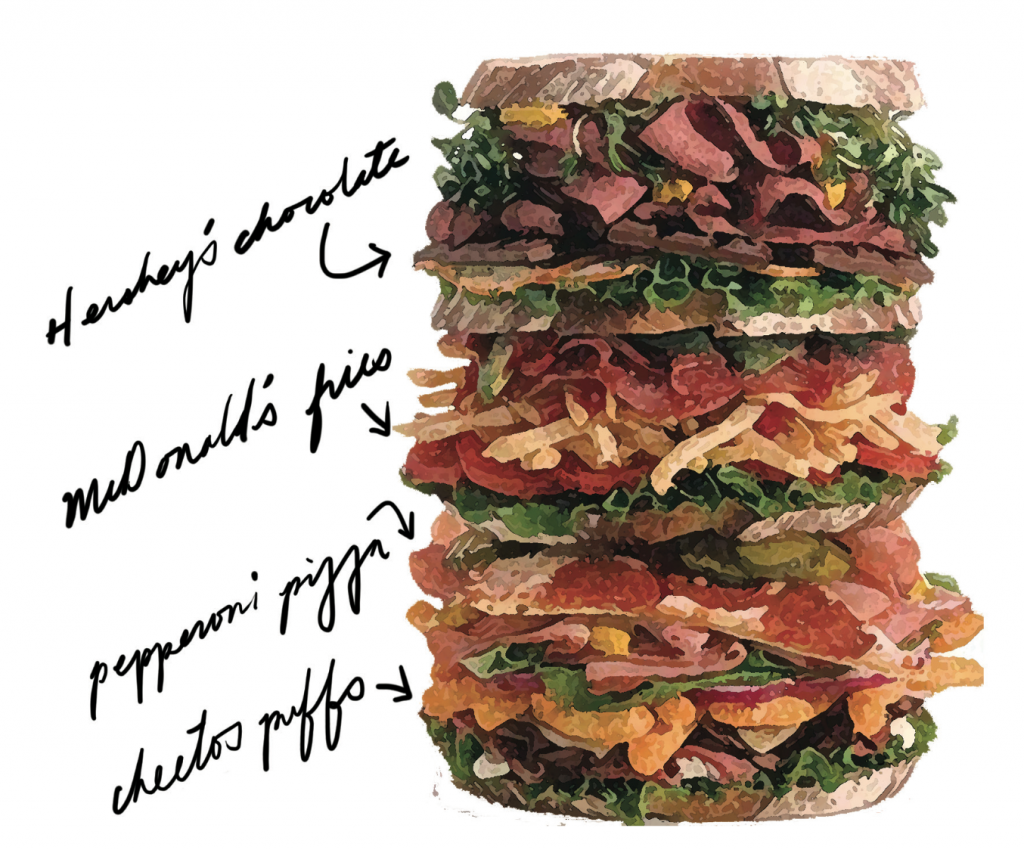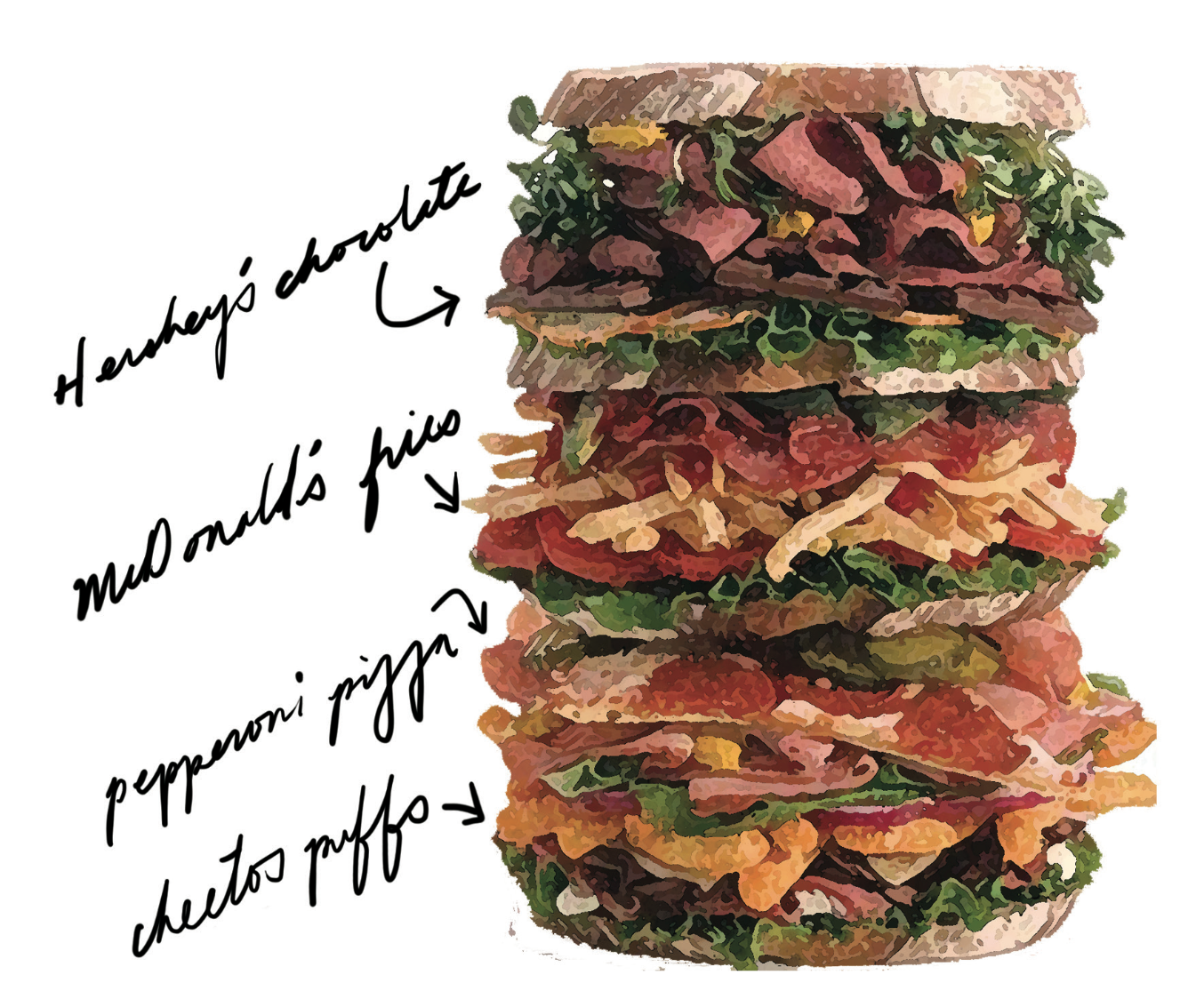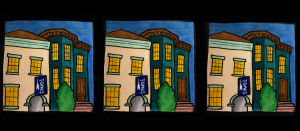
Illustration: Pam Shu
My favorite food has always been and will always be the sandwich.
The sandwich, despite being named after a town in England, represents the cornerstone of the American dream. This is because it follows a general, instantly-recognizable formula, while still allowing for a diverse composition. At its most basic, the sandwich is two pieces of bread (hopefully a little bit toasted) with something in the middle. However, it can also be a complex gastronomical masterpiece, filled with garlic aioli, caramelized onions, exotic cheeses. It doesn’t even have to involve bread, as is evidenced by the doughnut burgers served up during late summer state fairs.
Over the past few years, I’ve tried many of these creations. Many of them are exquisite culinary delights, containing fresh ingredients and balanced textures. Some are not. Yet none have ever struck me as the perfect sandwich.
I’ve eaten the Buenos Aires at Sundevich, which is stuffed with tender steak, bathed in chimichurri sauce and served on a fresh baguette. Delightful. I’ve had the Wisconsin Grilled Cheeseburger at Farmers Fishers Bakers, which boasts whole grilled cheese sandwiches in lieu of buns. Amazing.
I’ve even tried my own hand at the craft of sandwich-making. Edible enough. But each taste, each bite, and each attempt has fallen short of some ideal that I cannot seem to shake from my palate.
To this day, the perfect sandwich has eluded me. I’ve always found it ironic how despite the vast array of ingredients at my disposal, I’ve never been able to find one that excels beyond the rest. There are a seemingly infinite number of promising combinations. At this point in my fledgling career as a sandwich chef, I’ve become paralyzed by the unending abundance of choice.
Outside of the world of sandwiches, this problem seemingly doesn’t exist. If a person has more choices available to them, they are logically more likely to find an option that best suits them. This makes sense to us because we view choice as a representation of freedom; therefore, more choice must equal more freedom. And since we generally correlate increased freedom with increased happiness, more choice means more happiness. This is a line of logic based on all of our assumptions about how economics and society work. This is a line of logic that underscores the idea of progress in Western civilization. This is a line of logic that is, simply put, wrong.
In a great TED talk from 2005, Dr. Barry Schwartz, a psychologist who teaches at Swarthmore College, refers to this quandary as the “paradox of choice.” He begins his lecture by describing the many choices that exist for salads in our modern supermarkets and for stereos in our electronics stores. Schwartz observes that the development of technology has brought choice to areas where it previously did not exist. For example, smartphones, which had just begun to crop up in 2005, made it possible for everyone to work at all times, as opposed to just when employees were in the office. This meant that people had to make the choice whether to work or to enjoy their time at home. Researchers found that the introduction of this option led to lower overall happiness – regardless of the choice the subject made.
For another example of this problem, look to one of the first major events at Georgetown: the CAB Fair. During this event, students take over the entire front lawn, tabling for the many clubs that operate on campus. Students can apply to do whatever they want with their fellow Hoyas. On top of this, students can even apply for funding to start a club themselves. You have a scenario here where students are afforded abundant choice and can pursue exactly what they want.
During the CAB Fair, students often feel overwhelmed by the sheer volume of available choices. And with so many options to choose from, it’s extremely hard for some to choose at all. This could result in students choosing too many and over-extending themselves, which might have lasting repercussions. But even if they avoid this pitfall and take on only as much as they can handle, some students might still experience lower overall satisfaction. Even though they may choose the path that was probably best, they’ve eliminated the possibility of all other paths. Because they had to do something, they lost the opportunity to do so much more.
If, in all things, the choice we made does not turn out to be perfect, we immediately begin cataloging what went wrong and our many regrets. This is amplified by the constant reminders that other choices exist delivered right to our phones through social media. When we see the people around us enjoying their new colleges, new clubs, and new friends, it amplifies our own insecurities and regrets. Our expectations for ourselves get even higher, and it’s our fault we are not achieving them. As such, we find ourselves stuck between a rock and a hard place. The abundance of choice prevents us from finding total satisfaction.
The average discussion about choice is fairly monolithic: more choice is always good. And it is true that lack of choice is still a problem for many, especially when looking at the totality of our world community. Yet what is often ignored, and equally true, is that too much choice has a negative, paralyzing counter-effect. Here at Georgetown, many of us are stuck wondering about the sandwiches that weren’t.
Carrying On is a rotating column written by Voice staffers.






